WATCH: #WrestleBudapest Freestyle Finals
Thursday, March 31, 2022 - 10:11 By Eric Olanowski

BUDAPEST, Hungary (March 31) --- The freestyle portion of the 2022 European Championships lived up to the hype in the Hungarian capital. Taha AKGUL (TUR), one of wrestling's biggest stars, added a ninth European gold medal to his resume, while new stars Georgios Kougioumtsidis (GRE), Magomedkhan Magomedov (AZE) and Myles AMINE (SMR) introduced themselves to the wrestling world en route to winning their first continental titles.
Here are the ten freestyle finals from the #WrestleBudapest European Championships.
57kg: Vladimir EGOROV (MKD) df. Aliabbas RZAZADE (AZE), 8-6
Vladimir Egorov (MKD) wins the European gold medal for North Macedonia finishing a 23-year wait by defeating the U23 World Champion Aliabbas Rzazade (AZE) at 57kg.
Egorov began with a takedown. That was the only action in the first period and he led 2-0 at the break. But the second period saw him come out with an arm-trap and he scored six straight points to lead 8-0. Rzazade tried making it interesting with six points in the second period but the bout was not as close as the 8-6 scoreline suggests.
61kg: Arsen HARUTYUNYAN (ARM) df. Suleyman ATLI (TUR), 15-3
Arsen Harutyunyan (ARM) won his second European gold medal as he defeated former world silver medalist Suleyman Atli (TUR) in the 61kg final. In a dominating performance, Harutyunyan won, 15-3.
Harutyunyan caught Atli by surprise when he threw him for four and then leg laced to lead 6-0. Another single-leg takedown made it 8-0 but Armenia asked for another exposure and the win. He lost the challenge and Atli scored a takedown to cut the Armenian's lead to 8-3.
The U23 World champion went straight on the offensive in the second period and got the takedown, during which Atli called for a medical timeout. When the bout resumed, Atli was forced in par terre, and Harutyunyan managed to finish the bout 15-3 with two gut wrenches.
65kg: Iszmail MUSZUKAJEV (HUN) df. Haji ALIYEV (AZE), 12-1
Iszmail Muszukajev (HUN) may have broken his infamous curse of fizzling out in the second period of the bout.
What fans witnessed Tuesday was a different Muszukajev who not only ended Hungary's 19-year wait for a freestyle European champion, he destroyed two-time Olympic medalist Haji Aliyev (AZE) with a 12-1 victory in the 65kg final. "I didn’t expect that score," Muszukajev said.
"The opponent is really good and last time it was really difficult to win. This time I was in a better shape, after the Olympics I got down to training straight away and I was mentally preparing for the European Championships."
Muszukajev has once again put himself in the mix of top wrestlers at the deepest weight category in the world. He is now a European champion in Hungary, ending the 21-year wait for the host nation.
70kg: Zurabi IAKOBISHVILI (GEO) df. Arman ANDREASYAN (ARM), 2-1
At 70kg, 2017 world champion Zurabi Iakobishvili (GEO) captured his first-ever European title when he defeated Arman Andreasyan (ARM) in the final, 2-1.
"I had the gold medal of the Worlds but not a European gold," Iakobishvili said. "That's why I came here to Hungary and I am happy I’ve won it.
74kg: Tajmuraz Mairbekovic SALKAZANOV (SVK) df. Frank CHAMIZO MARQUEZ (ITA), 7-5
At 74kg, Tajmuraz Salkazanov (SVK) defended his gold medal against two-time world champion Frank Chamizo (ITA) in a thrilling final, winning it 7-6 in the final second. Chamizo was set to win 5-5 on criteria, but Salkazanov managed to score a step-out before the clock expired to take the win.
Despite his back-to-back golds, the Oslo silver medalist was not satisfied with his wrestling and thought he could have won it a little easier.
"I am not satisfied with my wrestling," Salkazanov said. "In the beginning, I made a mistake, but even after that I didn't give up, I believed that I could win till the very end. I saw he stepped out and it seemed to me that I got the point. When I threw the challenge, I was still ready to keep wrestling. I was thinking that even if I get that one point, it doesn't mean anything. I had to do my best on the mat. So, I made it happen. I tried hard to attack and I made it."
"My main goal is to become the world champion," he said. "Last year I was one step away from it. After that, I was so disappointed because I was supposed to win that match. I hope this year I will make it happen."
79kg: Georgios KOUGIOUMTSIDIS (GRE) df. Ashraf ASHIROV (AZE), 7-6
Georgios Kougioumtsidis (GRE) became Greece's first-ever freestyle European champion after he won the 79kg gold.
Two weeks earlier, Kougioumtsidis had won the U23 European Championships in Plovdiv, Bulgaria, and was unsure of participating in the senior event. But after the perusal of his father and trainer, he accepted the challenge. "They told me that this experience can help me later in my career," Kougioumtsidis said.
"I am so proud and happy to be my country's first-ever gold medalist."
86kg: Myles Nazem AMINE (SMR) df. Abubakr ABAKAROV (AZE), 9-5
Tokyo bronze medalist Myles AMINE (SMR) added another page to San Marino's wrestling history when he won the nation's first-ever European Championships gold by beating Oslo bronze medalist Abubakr ABAKAROV (AZE), 9-5, in the final.
"He [Abakarov] is funky," Amine said. "I got in on that first shot and it felt too easy. His left leg is his best defense so I tried to get my attacks on his right leg and that kind of started working and I opened up my attacks. He was a guy that I had to adapt against otherwise I was going to probably lose that match."
Since winning San Marino's first-ever Olympic medal in wrestling, Amine has been improving and looks to continue that.
"Two weeks ago, I had a tough loss in the final of NCAA," he said. "I beat the guy in the final of Big 10 Championships. I was excited to come and compete to put that loss behind me. As much as I say that I have to agree that in the last 10 months, I have been blessed by god."
"I will take a few weeks off and come back again because that worked after Olympics. Go back to the drawing board and see where I can improve. I am sure I need to improve my par terre."
92kg: Feyzullah AKTURK (TUR) df. Ahmed Sultanovich BATAEV (BUL), 6-1
Feyzullah Akturk (TUR) added a senior European title to his U23 title by defeating Ahmed Bataev (BUL), 6-1, in the 92kg final. Akturk scored four step-outs and a takedown in a final, which he called 'exhausting.' "I very proud to win and carry the [Turkey] flag," Akturk said.
"The final was exhausting but with the gold medal, all the burden of the final fight fades away."
97kg: Magomedkhan Magomedovitch MAGOMEDOV (AZE) df. Vladislav BAITSAEV (HUN)
At 97kg, Magomedkhan Magomedov (AZE) wrestled Vladislav Baitsaev (HUN) in the summit clash and used two four-point throws in his 11-5 win. That result gave Azerbaijan its first gold of the night.
"I have wrestled Baitsaev before," Magomedov said. "I understood his wrestling and thankfully I was able to win my first gold."
125kg: Taha AKGUL (TUR) df. Geno PETRIASHVILI (GEO), 5-2
Akgul, the defending European champion, defeated Petriashvili, 5-2, in the 125kg gold medal bout at the European Championships in Budapest, Hungary. He won his ninth European title and extended his head-to-head record against the Georgian at the Continental Championships to 5-1.
"It was my goal to come here and break my own record of eight European gold," Akgul said.
"It was a great fight against a great wrestler." The mutual admiration between the two was visible at the medal ceremony, where Petriashvili did not hesitate to congratulate Akgul for his ninth title. "It's always dramatic with Geno [Petriashvili]," Akgul said.
"It's crazy that I keep beating him at the Europeans but he has a streak against me at the Worlds. So I will try to keep winning the gold at Euros and will soon break his streak against me at the World Championships."

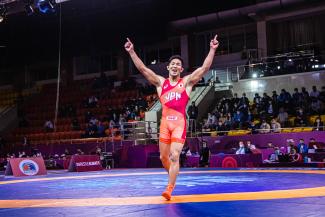
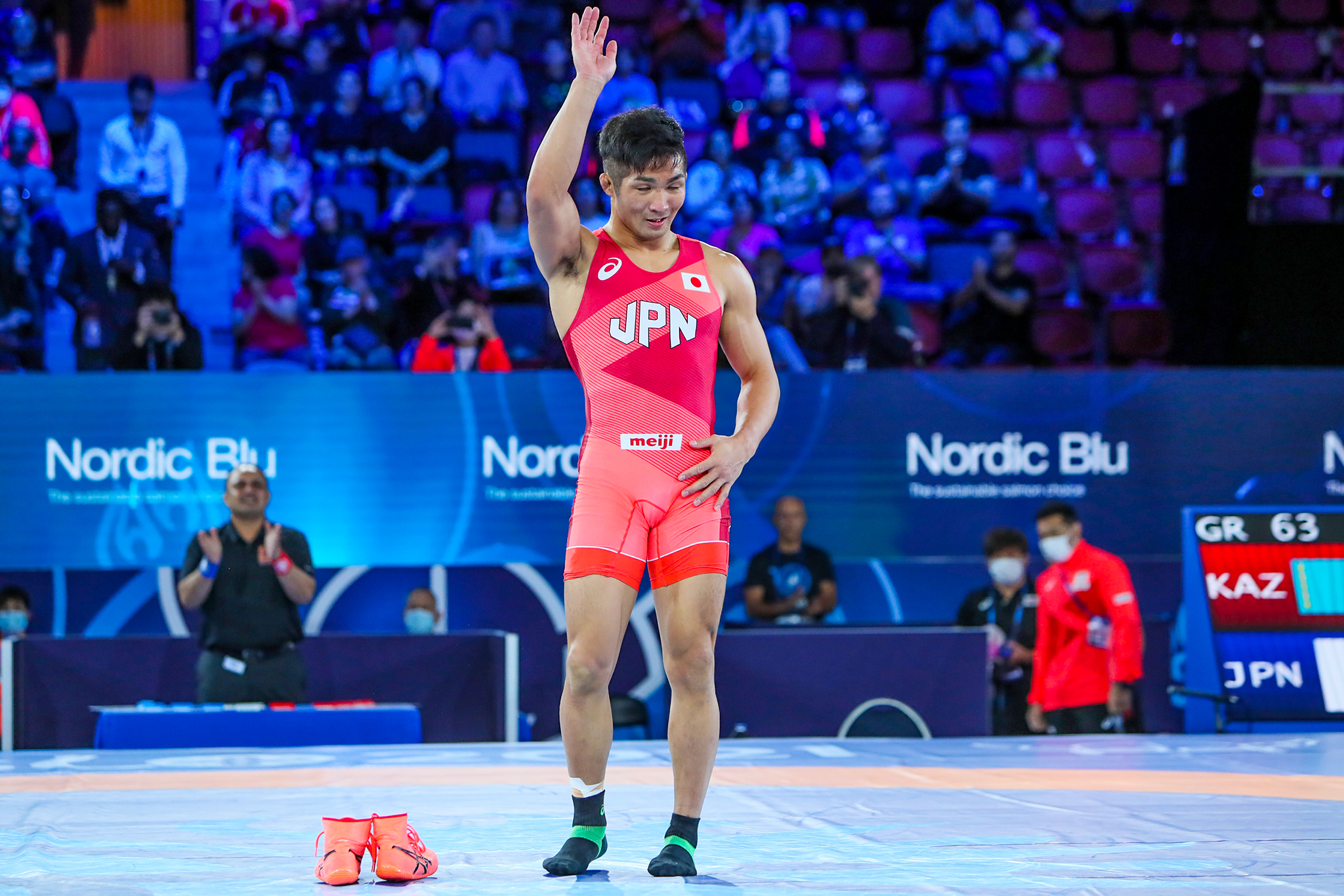 Tsuchika SHIMOYAMADA (AUS) had left his shoes on the mat during the 2021 World Championships to mark his retirement. (Photo: United World Wrestling / Martin Gabor)
Tsuchika SHIMOYAMADA (AUS) had left his shoes on the mat during the 2021 World Championships to mark his retirement. (Photo: United World Wrestling / Martin Gabor)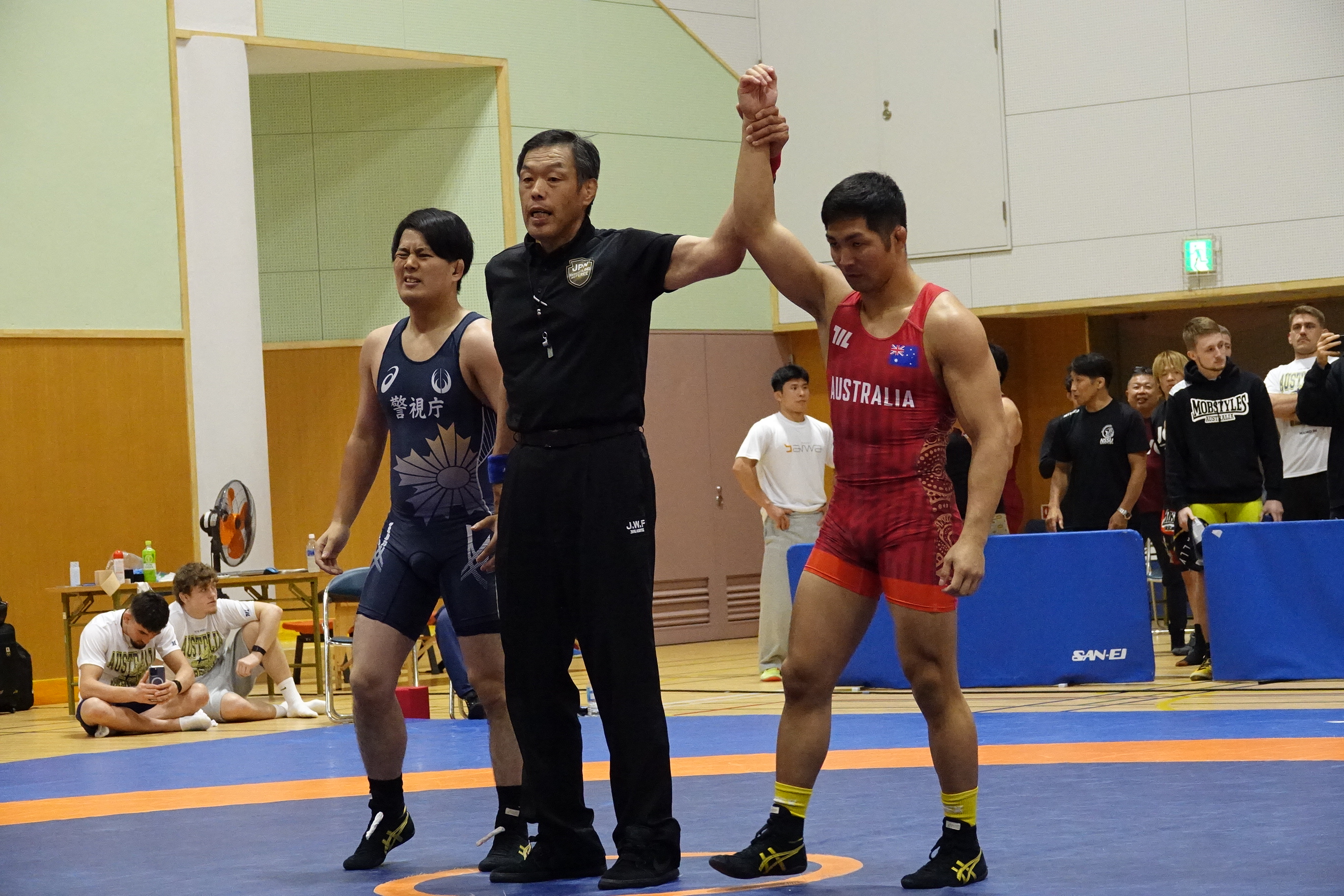 Tsuchika SHIMOYAMADA advances to the semifinals at the All-Japan Non-Student Championships in July with a 52-second win over Kokoro GOTO. (Photo: Koji Fuse / wrestling-spirits.jp)
Tsuchika SHIMOYAMADA advances to the semifinals at the All-Japan Non-Student Championships in July with a 52-second win over Kokoro GOTO. (Photo: Koji Fuse / wrestling-spirits.jp)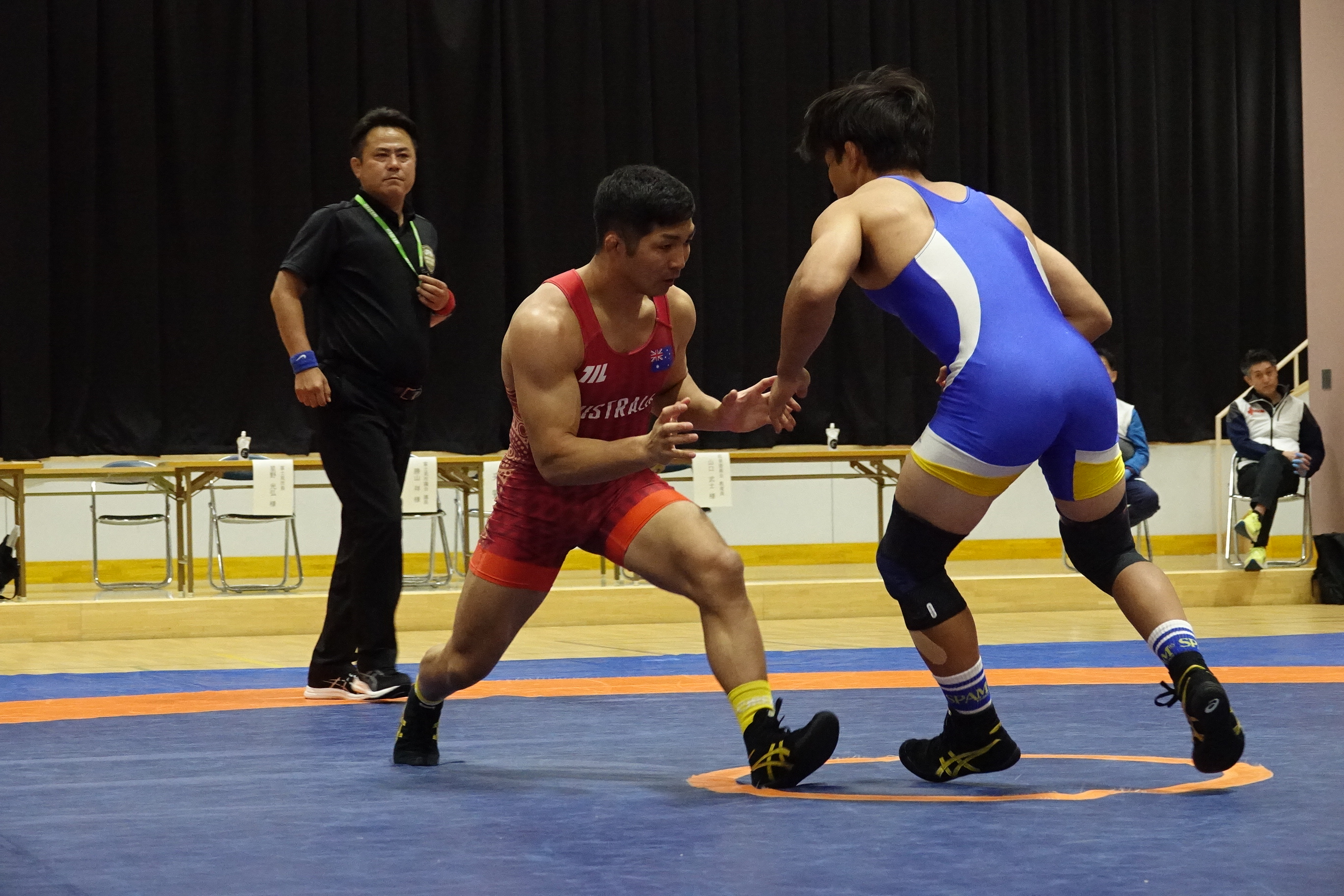 Tsuchika SHIMOYAMA faces Keitaro ONO in his opening match at the All-Japan Non-Student Championships in July. (Photo: Koji Fuse / wrestling-spirits.jp)
Tsuchika SHIMOYAMA faces Keitaro ONO in his opening match at the All-Japan Non-Student Championships in July. (Photo: Koji Fuse / wrestling-spirits.jp)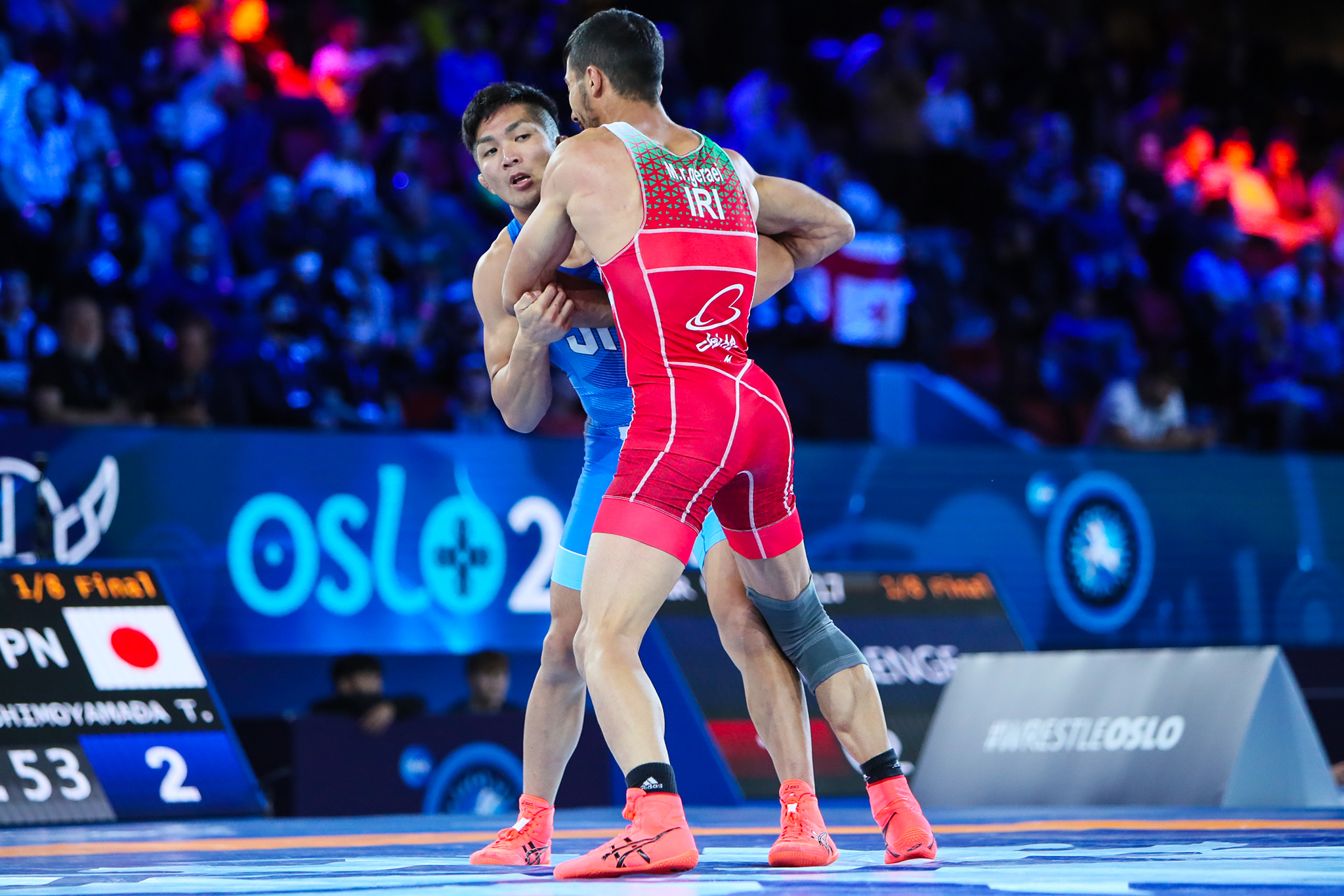 Tsuchika SHIMOYAMADA (AUS) was dominating Mohammadreza GERAEI (IRI) in their match at the 2021 World Championships before being pinned. (Photo: United World Wrestling / Martin Gabor)
Tsuchika SHIMOYAMADA (AUS) was dominating Mohammadreza GERAEI (IRI) in their match at the 2021 World Championships before being pinned. (Photo: United World Wrestling / Martin Gabor)
Share your thoughts.
Comments